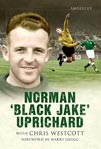 An Autobiography
An Autobiography
by Norman Uprichard with Chris Westcott
Amberley, £14.99
Reviewed by Robbie Meredith
From WSC 300 February 2012
It is a standard and understandable practice for footballers who played long before the Baby Bentley-fuelled Premier League age to use parts of their autobiography to lament some of the traits of the modern pro. Norman Uprichard, the notoriously brave Northern Irish goalkeeper who played for Arsenal and Portsmouth in the old Division One in the 1950s, is an exception to the rule. He has virtually nothing, negative or positive, to say about the game after his own career finished in 1961. It is a pity, as he had more right than most to regret missing out on the comparative riches available to later generations.
Even by the standards of his time, Uprichard had a hard upbringing. His father died from tuberculosis when he was only six years old and he grew up alone with his mother in a house where hay for the cow was kept in the front room. Yet as he reminisces about moving from small-time Irish League reserve football to the bright lights of London and then seven happy seasons at Portsmouth, soured only at the end, he seems perpetually happy with his lot, even if he does come across as a rather spiky character.
Sadly, we are offered only tantalising glimpses of some of the more interesting stories lurking behind Uprichard's fond memories. This was a man, after all, who was playing occasional non-League football while running a pub in his early thirties, a mere two years after being applauded off the pitch at the Bernabéu by Alfredo di Stéfano. He tells us, for instance, that Nat Lofthouse was not in the same class as Tommy Lawton or Jackie Milburn "as a footballer or a gentleman" but never explains why.
Towards the end of his time at Portsmouth, Uprichard wrote a column in the Daily Express criticising his own manager, Freddie Cox. It is still an almost unthinkable act today but we get frustratingly little on what either Cox or his team-mates thought about the episode. There is also a chapter called "Black Jake and the Demon Drink" which implies Uprichard likes alcohol a little too much, yet aside from a quaint admission that he enjoyed getting "pissed as a pudding", his recollections are only of good times had by all.
The book may have worked better as biography than autobiography. The ghostwriter Chris Westcott was obviously relying on an old man's recollection of events from half a century ago. Uprichard died in his eighties in early 2011 and it is unsurprising that from that distance he looks back fondly on his career, team-mates and opponents. A biographical approach might have allowed Westcott to provide some of the detail and context that Uprichard's memory omits, and give more depth to a rather slim volume.
Still, it is refreshing to read the story of someone who seems to have had a genuine appreciation of his life. The numerous pictures that flesh out the book are a joy, capturing the drama and camaraderie of an era too often overlooked as an endless procession of "Super Sundays" unfolds.